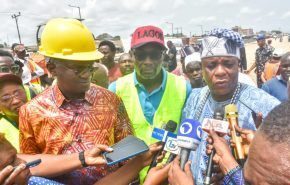Nigeria
Fashola updates the developments for the Lagos-Badagry Expressway and the Lagos-Otta-Abeokuta Road

On Saturday, Mr Babatunde Fashola, Minister of Works and Housing, expressed satisfaction with the development of all three sections of the current repair and rehabilitation project for the Lagos-Badagry Expressway.
During the highway’s inspection, Fashola noted that the project had made enormous strides since 2015.
The Special Advisor on Works and Infrastructure to Governor Babajide Sanwo-Olu, Ms. Aramide Adeyoye, the Commissioner for Transportation, Dr. Frederick Oladeinde, and other senior engineers joined him on the inspection.
“This is proof of the Buhari administration’s dedication to our infrastructure,” he remarked.
He said that the project is a piece of the motorway between Lagos and Abidjan, which carries over 40 million travellers all the way to Ivory Coast.
Fashola claimed that by beginning to build its own portion of the project, Nigeria has shown leadership.
During a 22-kilometer stretch of section three, he said the last layer of work had been completed.
Our engineer’s representative told me that, except from the first three kilometres, all work had been finished up to kilometre 22 while we were in the last 22 kilometres leading up to the Badagry roundabout.
The only thing remaining is the wearing course, which you can see being set up around kilometre one plus 800.
“Thus, kilometre 22 is only approximately 200 metres away. According to him, this section of the road would have three lanes on a dual carriageway.
He described the status of the different highway sections, noting that sections one and two were finished.
Fashola asserted that section three’s money was secure since NNPC had assumed responsibility for it.
Three independent contractors are reportedly working on the roadway under the supervision of the Federal Ministry of Works, FERMA, and the Lagos State Government, according to the News Agency of Nigeria (NAN).
The first section of the project, which runs from Eric Moore to Okokomaiko, is under the control of the Lagos State Government.
The Federal Ministry of Works is in charge of section three, which runs from Agbara to the Seme Border, while the Federal Roads Maintenance Agency (FERMA) is in charge of section two’s rehabilitation, which runs from Igboelerin to Agbara.
Fashola listed the financial advantages the initiative has given to both small and large enterprises along the Badagry corridor.
He said it was a component of the government’s plans to lift millions of people out of poverty under the leadership of Buhari.
The minister said that highway travel times had also decreased.
Oba Isreal Okoya, the traditional head of Ibereko in Badagry, expressed gratitude to President Buhari for the project and confirmed that it had improved inhabitants’ quality of life and cut down on travel time.
Yet, in order for the villages to fully benefit from the initiative, the traditional ruler urged its swift completion.
According to NAN, Fashola’s government, then-governor of Lagos State, conceptualised the development of the Lagos-Badagry Expressway in 2009, a key gateway linking Nigeria and other West African nations.
The minister claimed that SUKUK was funding the Lagos-Otta-Abeokuta project and that construction had started in Lagos.
If people waited patiently, he claimed, the job would be finished up to the Ogun State side.
He stated that three projects, Ikorodu-Sagamu, Lagos-Ibadan Expressway, and Lagos-Badagry Expressway, which all connected Ogun, were continuing and that the fourth link route, Lagos-Otta-Abeokuta, required patience.
“The Lagos-Otta-Abeokuta project is being worked on; with patience, we will complete it. Simply be patient, he said.
He vowed to obtain information on the planned Glo Tax Credit for the Lagos-Otta-Idiroko project in order to guarantee that the discussions were concluded and that it would be granted.
He clarified that each stage of the procurement process, starting with design, was crucial.
